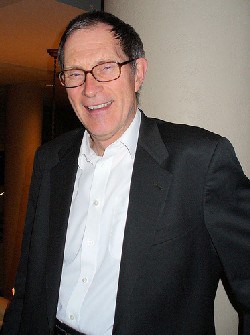
He loves a good metaphor
By James Dacey
Science reporting should make more use of metaphors in order to explain difficult technical concepts. That is the opinion of Geoff Ryman, an award-winning science fiction writer, voiced at the World Conference of Science Journalists in London yesterday.
Ryman, who is also a lecturer at the University of Manchester, subscribes to the “mundane” school of sci-fi – rejecting “sexy” ideas like flying saucers and tentacled aliens in favour of more down-to-Earth, preferably “human” concepts. In 2006 he won the Arthur C. Clarke award for Air, a novel based on the idea of a successor to the internet which connects people’s brains via an invisible substance… known as Air.
Ryman’s line of argument – and it’s a well-trodden one – is that the general public only tend to engage in science and technology writing when it is presented to them in everyday concepts. “The best science writing tells a human story,” he said and, as a science fiction writer, he places himself amongst the “lay readers” drawing inspiration from ideas that touch him on an emotional rather than an abstract level.
According to the author, science journalism need not be any different from his approach, other than the fact that it’s obviously “limited” by scientific truths.
Sitting there yesterday, I thought Ryman did make some good points and he certainly delivered them in an eloquent way. But it also seems to me that he holds a very narrow view of science and scientists, painting them as abstract entities, disconnected from the rest of everyday life. This is simply not true.
I reckon that the distinction between good science and good fiction is a lot muddier than this because clear communication is absolutely integral to both. Many of the great scientific ideas have been presented with a devastating clarity through striking metaphors. Take Darwin’s Tree of Life, take String Theory, take the Big Bang… and I’m sure there’s plenty more. Anyway, the survival of these ideas has – in my opinion – been aided by their ability to reduce the complexity of nature into simpler, everyday concepts… just like a work of great fiction.
Let me know what you think…



